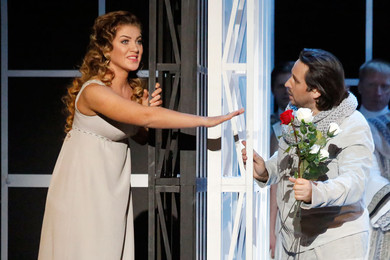Main Stage
Premiere of this production: 28 Oct 2015 The performance has 1 intermission Running time: 2 hours 40 minutes Libretto by Modest Tchaikovsky after “King René’s Daughter” by Heinrich Hertz Iolanta plus NutcrackerIolanta and Nutcracker were commissioned from Tchaikovsky by the Mariinsky Theatre management. It is thought that the idea of uniting the one act opera and two act ballet into a single production to be shown on the same evening originated with the then director of the Imperial Theatres Ivan Vsevolozhsky.
In July 1891 Tchaikovsky began composing the music for Iolanta, starting off with the Iolanta and Vaudemont duet. He was full of enthusiasm. The composer wrote to his brother Modest: "I'm in love more than ever with the subject of Iolanta, and your libretto is quite perfect… Oh yes, I will write an opera such that the audiences will weep". By September the music to all intents and purposes was completed and by December – so was the orchestration. The première of Iolanta (and of the ballet Nutcracker) took place at the Mariinsky Theatre on 6 December 1892. Tchaikovsky wrote to his brother Anatoly: "The opera and ballet had great success yesterday. The opera in particular was to everyone's liking. The night before we had a rehearsal with the Emperor. He was enraptured, called me to the box and uttered a mass of sympathetic words. Both were staged magnificently, and the ballet was even too magnificent: the eyes tire of such sumptuousness". A year later, on 11 November 1893, Iolanta was given its first performance at the Bolshoi Theatre. In all there have been six productions of Iolanta at the Bolshoi (in 1893, 1899, 1917, 1940, 1974 and 1997). In 2015 Iolanta was presented for the first time at the Bolshoi Theatre together with its ‘lost twin’ Nutcracker though, true, in the form of the Symphonic Suite rather than the two-act ballet. But, for all that, Tchaikovsky and Vsevolozhsky’s idea of uniting the two works into a single production, rather than simply presenting them as a double bill on the same evening, was realized. The production is by Sergey Zhenovach, the artistic director of The Theatre Art Studio, and an acknowledged maître of giving major works of literature a new lease of life on stage. Working with him on the production were his permanent co-authors: scenographer Alexander Borovsky and lighting designer Damir Ismagilov. Sergey Zhenovach: It will doubtless come as quite a surprise when, to start off with, the orchestra plays the suite with curtain down, after which the performance itself - Iolanta - gets underway! The task which faced us was to think up one story, one composition. And it even seems to me now that without Nutcracker, it would have been less interesting. Even before the events in the opera start to unfold, the music of the Nutcracker Suite shows us Iolanta’s inner world. This incredibly poetical, fairy-tale-like suite is our heroine’s inner music. The story is indeed very poetical. The first thing one has to avoid at all costs in Iolanta is a homespun, naturalistic interpretation. As soon as the action begins to acquire a homespun character, this subtle, fragile, naïve opera simply disintegrates. It was therefore vital that our production be poetical. Our aim was to locate a real, human story through these poetic images: what is light, what is darkness, what is blindness and the recovery of sight, what are these “two worlds of the flesh and of the spirit”? We had above all to find a figurative, spatial expression of the poetic language of the opera. To create a world of darkness and a world of light. Iolanta is a very pure, naïve, radiant opera, but by no means as simple as it seems. In terms of character, I would compare it to Mozart’s Die Zauberflöte. It is an imaginary tale with philosophical meaning, and a serious subtext. And its philosophical content today is very distinct and clear.
SynopsisIolanta, the blind daughter of the King of Provence, is telling her nurse, Martha, that she is full of some unknown longing. Iolanta's friends, Brigitte and Laura, try to cheer her up by singing songs and bringing her flowers. Martha also tries to comfort Iolanta by singing her favorite lullaby. This sends Iolanta to sleep. | ||||||||||


